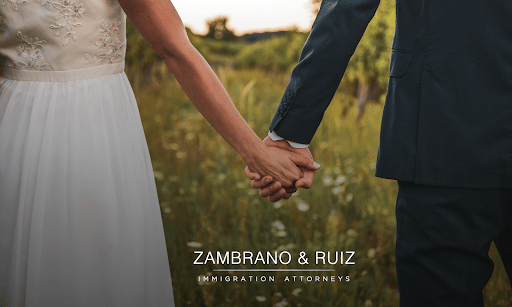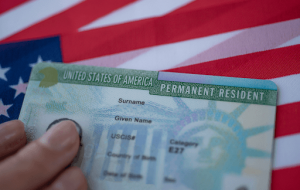Love is accidental; out of nowhere, it can suddenly appear while visiting a relative abroad, on vacation during a Caribbean cruise, on a business trip, or even during a pilates class.
No matter how or where you met “your soulmate,” love has no boundaries. That being said, your spouse’s immigration status and their process should not be a problem. Therefore, to help you build a future alongside your loved one, we will explain the top 3 legal aspects you should know before marrying a foreigner.
No matter how or where you met “your soulmate,” love has no boundaries. That being said, your spouse’s immigration status and their process should not be a problem. Therefore, to help you build a future alongside your loved one, we will explain the top 3 legal aspects you should know before marrying a foreigner.
1) There is the K-1 Visa, for those who want to get married on U.S. soil.

- Whether you proposed on a trip to Paris or met your fiancé(e)’s family overseas and decided to have them as part of the proposal, where and how you proposed doesn’t matter that much. What matters is whether the wedding will be on U.S. soil or not. If so, as a U.S. citizen, you can sponsor your fiancé(e) and apply for the K-1 visa to get married here.
- The K-1 visa, also known as a fiancé(e) visa, allows your future spouse to travel to the U.S. for marriage. The condition is that there must be an intention of getting married within 90 days of their arrival. We recommend your fiancé(e) doesn’t extend their travel period. In the unfortunate event you don’t get eloped during this time, your fiancé(e) must leave the country. Failing to comply can cause them to be deported and jeopardize their chances of having other immigration benefits.
- After getting married, your new spouse can later apply for an adjustment of status to become a U.S. permanent resident and receive a green card. Remember, the USCIS states that the marriage must be legitimate in which there is an intention that both you and your fiancé(e) are going to establish a life together and that the marriage is not to provide them immigration benefits.
2) K-3 Visa, for those couples that wish to get married outside the U.S.

- In the event you marry your fiancé(e) in their native country or outside of the United States, your partner can still enter the U.S. by applying for the K-3 visa. By having this visa category, your spouse is also eligible for an adjustment of status to become a permanent resident.
- With the K-3 visa, it is important to know that your partner must apply for it in the country where you got married. In addition, in order for your loved one to be legally qualified as a spouse, it is not enough to live together in the U.S.; you must legally elope.
- However, according to the USCIS, couples that have a material union in another country may qualify for the K-3 visa dependent on how each country defines common-law marriage. It is important to note that in polygamous relationships, only the first spouse is eligible for this visa.
3) Is it possible to get married on a tourist visa?

- When getting married to your partner that has a tourist visa, we recommend following a series of steps that will help avoid any legal problems.
- For starters, you should know that it is perfectly legal to marry a foreigner who entered the United States with a B-2 visa, also known as a tourist visa. However, your marriage must be spontaneous, meaning that there wasn’t a planned intention of marrying your fiancé(e) before they entered the U.S. In other words, you both met each other while your future spouse was on a trip here.
- Issues may arise if there is evidence that the marriage was planned in advance since there is already a dedicated visa for this purpose, the K-1 visa.
- Immigration authorities may feel that your spouse has engaged in fraudulent activity if they find that you planned to marry your fiancé(e) on a tourist visa.
- Remember: immigration officials have the authority to decide your case’s outcome, and if they feel that your spouse lied during their applicant interview or upon entering the country, your partner may be deported or banned from entering the United States.
- Therefore, if you decide to get married to your fiancé(e) with a tourist visa, the ceremony shouldn’t take place within the first 90 days of your partner’s entry into the country to avoid the marital union being interpreted as visa fraud.
- On the other hand, we recommend your partner return to their country after getting married and apply for an adjustment of status from there. While this process can take months, it will save you the hassle of having doubts about the legitimacy of your marriage.
- Whatever path you decide to take to marry your partner, you should seek the advice of immigration lawyers. Here at Zambrano & Ruiz, we can help make your dream of building a future with your partner in the United States a reality. Call us now at 770-769-5820 to schedule a free consultation of your case.





